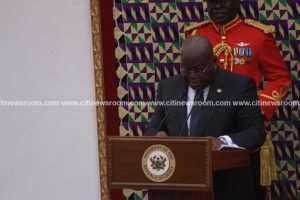
President Nana Akufo-Addo has reiterated his government's commitment to maintaining the needed discipline to ensure that Ghana does not return to the International Monetary Fund (IMF) for the 17th time.
He made the comments while delivering his third State of Nation Address to Ghanaians in Parliament today.
A team from the IMF this week completed the 7th and 8th reviews under the Extended Credit Facility program which Ghana entered into in 2015. An approval from the IMF board in March should lead to Ghana exiting the program after April 3rd.
But delivering his State of the Nation Address, President Akufo-Addo stated that in order not to repeat the cycle of returning to the Fund immediately after exiting, Ghana will have to ensure that systems put in place like the Fiscal Council, which are to ensure discipline in the management of the economy, are as effective as possible.
“We've just concluded the program with the IMF and with continued discipline, we shall sign off from the deal in April. This is the 16th time Ghana has had to go to the IMF in its history. Mr. Speaker we cannot make the progress we all desire unless we are consistent and disciplined in the management of our economy. We have gone through another round of painful impositions to get to where we are today with healthy fundamentals.”
The President added that a repeat of actions that led to a return to the IMF in the past will not be repeated under his government.
“As we prepare to exit from the IMF program we expect the impressive figures and good performance to continue. We are very much aware that this is not the first time we have had such good a set of figures, but we're determined to do things differently this time around. We've imposed on ourselves fiscal discipline, we're paying off legacy debts and deepening good governance practice and business confidence is growing. We will maintain the discipline and bring progress to our country.”
IMF final review
Ghana program with the IMF for US$918 million which was approved on April 3, 2015, aims to restore debt sustainability and macroeconomic stability in the country to foster a return to high growth and job creation, while protecting social spending.
The government has given assurances that the economy will remain resilient and robust even after the International Monetary Fund (IMF) program is over.
Speaking exclusively Citi Business News after the final meeting, Chairman of the Finance Committee of Parliament Dr. Assibey-Yeboah said he is confident Ghana will successfully exit the extended credit facility program after April 3rd.
“Clearly Ghana is exiting the program after April third as already agreed upon. You'll recall that we went to the fund for policy credibility. So if you exit they have to sign you off. We want a clean bill of health, so the IMF team will go to the board at the end of March after which the board will decide as to whether or not Ghana has successfully completed the program.”
Throughout the various reviews, Directors of the IMF have commended Ghana on a number of things, welcoming the deceleration in inflation as well as the progress made in the strengthening the banking system, in particular through the approval of timebound recapitalization plans for undercapitalized banks.
On the things that need to be worked on, the Directors emphasized the need to tackle energy sector inefficiencies, particularly improving the management of the state‑owned enterprises (SOEs). They also advised that ongoing debt restructuring efforts are helpful but are no substitute to stemming the SOEs' financial losses.
While highlighting the progress Ghana has made under the program, Dr. Assibey-Yeboah went on to share some of the benefits of successfully exiting the program for Ghana.
“If we successfully exit the program, then we are found to be credit worthy, it affects our ratings, it affects the cost of borrowing and we are able to tap into other markets because the IMF says these people are credible and they are credit worthy.”
He finally added that apart from the disbursement of the final tranche of about $118 million from the IMF, Ghana was looking at receiving other disbursements from bodies like the World Bank as a result of successfully exiting the program.
Source: citibusinessnews.com/Ghana




 We’ll no longer tolerate your empty, unwarranted attacks – TUC blasts Prof Adei
We’ll no longer tolerate your empty, unwarranted attacks – TUC blasts Prof Adei
 Bawumia donates GHc200,000 to support Madina fire victims
Bawumia donates GHc200,000 to support Madina fire victims
 IMF to disburse US$360million third tranche to Ghana without creditors MoU
IMF to disburse US$360million third tranche to Ghana without creditors MoU
 Truck owner share insights into train collision incident
Truck owner share insights into train collision incident
 Paramount chief of Bassare Traditional Area passes on
Paramount chief of Bassare Traditional Area passes on
 Two teachers in court over alleged illegal possession of BECE papers
Two teachers in court over alleged illegal possession of BECE papers
 Sunyani: Victim allegedly shot by traditional warriors appeals for justice
Sunyani: Victim allegedly shot by traditional warriors appeals for justice
 Mahama vows to scrap teacher licensure exams, review Free SHS policy
Mahama vows to scrap teacher licensure exams, review Free SHS policy
 Government will replace burnt Madina shops with a new three-story, 120-store fac...
Government will replace burnt Madina shops with a new three-story, 120-store fac...
